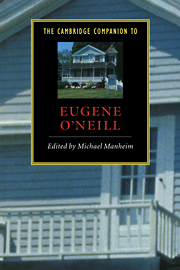Book contents
- Frontmatter
- Introduction
- 1 Celebrant of loss: Eugene O'Neill 1888-1953
- 2 O'Neill's philosophical and literary paragons
- 3 O'Neill and the theatre of his time
- 4 From trial to triumph: the early plays
- 5 The middle plays
- 6 The late plays
- 7 Notable American stage productions
- 8 O'Neill on screen
- 9 O'Neill's America: the strange interlude between the wars
- 10 O'Neill's African and Irish-Americans: stereotypes or “faithful realism”?
- 11 O'Neill's female characters
- 12 "A tale of possessors self-dispossessed"
- 13 Trying to write the family play: autobiography and the dramatic imagination
- 14 The stature of Long Day's Journey Into Night
- 15 O'Neill and the cult of sincerity
- 16 O'Neill criticism
- Select bibliography of full-length works
- Index
2 - O'Neill's philosophical and literary paragons
Published online by Cambridge University Press: 28 May 2006
- Frontmatter
- Introduction
- 1 Celebrant of loss: Eugene O'Neill 1888-1953
- 2 O'Neill's philosophical and literary paragons
- 3 O'Neill and the theatre of his time
- 4 From trial to triumph: the early plays
- 5 The middle plays
- 6 The late plays
- 7 Notable American stage productions
- 8 O'Neill on screen
- 9 O'Neill's America: the strange interlude between the wars
- 10 O'Neill's African and Irish-Americans: stereotypes or “faithful realism”?
- 11 O'Neill's female characters
- 12 "A tale of possessors self-dispossessed"
- 13 Trying to write the family play: autobiography and the dramatic imagination
- 14 The stature of Long Day's Journey Into Night
- 15 O'Neill and the cult of sincerity
- 16 O'Neill criticism
- Select bibliography of full-length works
- Index
Summary
Against the wall between the doorways is a small bookcase, with a picture of Shakespeare above it, containing novels by Balzac, Zola, Stendahl, philosophical and sociological works by Schopenhauer, Nietzsche, Marx, Engels, Kropotkin, Max Stirner, plays by Ibsen, Shaw, Strindberg, poetry by Swinburne, Rossetti, Wilde, Ernest Dowson, Kipling, etc.
Rarely has a writer been so explicit about his literary preferences in a fictive work. Edmund Tyrone's bookcase in Long Day's Journey Into Night tells us what his alter ego, the young Eugene O'Neill, was reading round 1912. Significantly, Shakespeare is present only in the form of a picture. His collected works are found in the living room's other “large, glassed-in bookcase,” representing the contrasting taste of James Tyrone, Edmund's father. Naturally, O'Neill has arranged the two book collections to fit the generation conflict in the play: old versus new values.
- Type
- Chapter
- Information
- The Cambridge Companion to Eugene O'Neill , pp. 18 - 32Publisher: Cambridge University PressPrint publication year: 1998
- 2
- Cited by

